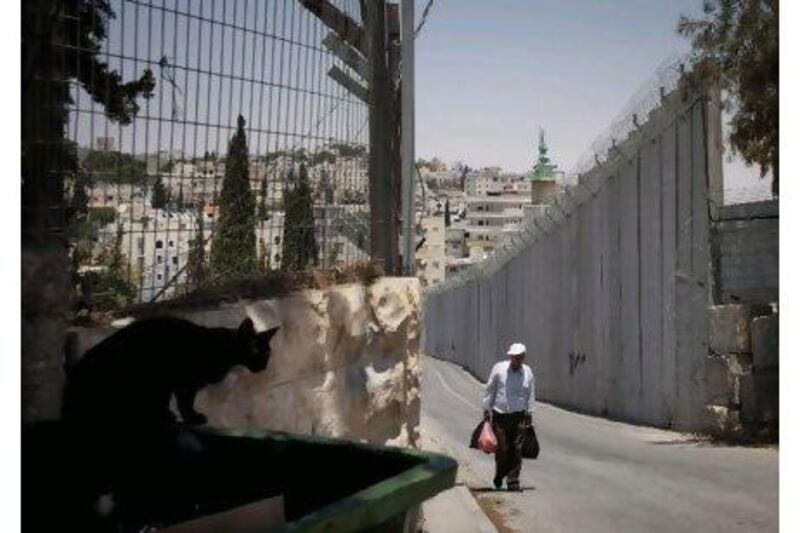ABU DIS, WEST BANK // Communities along Israel's separation barrier have complained of an increase in crime and tribal-based violence in the absence of state security.
Residents and Palestinian officials said trade in illegal drugs and stolen vehicles is flowing unchecked. There were two murders earlier this year, the result of a blood feud between local families in a place not known for such violence.
Armed gangs are said to roam unchecked at night, prompting some shop owners to set up their own CCTV camera systems. Some locals are stocking up on weapons.
Israeli police no longer patrol the neighbourhoods of Abu Dis and Sawahera, as they did before the barrier was built six years ago, severing tens of thousands of Palestinians from their families and businesses in nearby East Jerusalem.
According to residents and community leaders, the local economy has been crippled by the barrier's dividing presence and Israel's apparent lack of interest in providing security.
"It's completely crime-infested because of this," said Anwar Bader, 33, a member of the West Bank's ruling Fatah faction who is involved with the Abu Dis village council.
Mr Bader and others said the purported increase in crime and violence stems from dysfunctional security arrangements left over from the nearly two-decades-old Israel-Palestinian peace process, known as the Oslo Accords. The negotiations established what was meant to be a temporary division of control of Palestinian territories between the Palestinian Authority (PA) and Israel until the conflict was ultimately settled.
But resolution has never happened, and the security divisions remain in place. The Palestinian Authority now controls only a fraction of the West Bank.
Palestinian officials complain that Israel not only shirks its responsibilities in West Bank Palestinian areas where it ultimately controls security, such as Abu Dis, but also regularly prevents Palestinian law enforcement from doing its job.
"The Palestinian Authority keeps asking Israel and partners involved [in the peace process] like Tony Blair, the US government and European governments, to convince Israel to allow the Palestinian Authority to extend its services to all Palestinian people in the occupied territories," said Ghassan Khatib, a PA spokesman.
Israel's police have said such responsibility lies with its military, which controls the West Bank. The Israeli military did not respond to requests for comment.
Reforms under Salam Fayyad, the PA prime minister, have improved security in the larger Palestinian cities and towns in the West Bank, but Mr Khatib said many places where the PA has limited authority over security suffer from what he called "Israeli neglect".
Al Quds University, with its staff and approximately 12,000 students, is located directly between Abu Dis and Sawahera. The school has been caught in the crossfire of an expanding feud between families from the respective towns.
Residents say a dozen or so suspected members of the Muhsen family of Abu Dis allegedly beat Saher Mashahera, 34, from Sawahera in March, who died of his wounds later that month.
Cars and at least one building in Abu Dis were torched in the clashes that erupted following reports of Mashahera's attack as groups of young men from opposing sides unloaded weapons into the air, said Salah Ishkirat, the deputy director of Al Quds University's public relations department. "We had to close down the university for two days because people were shooting weapons in the street," he added.
The university had to evacuate its campus to prevent clashes between students from the feuding families, he said. "If families in the community and the staff didn't do this, this place could have exploded," Mr Ishkirat said. These areas, particularly Sawahera, are known for their powerful extended families.
Special units of PA security forces eventually had to plead with Israel for permission to enter the area, restore order and make arrests, Palestinian officials said.
Israel rarely grants such permission, said a Palestinian Authority police officer operating in the area who spoke on condition of anonymity.
The officer works out of a makeshift police station built several months ago in an apartment building in downtown Abu Dis. He and other officers have permission to keep a bare-bones presence in the town, but are essentially prohibited from tackling what he said were over 400 unsolved crimes.
He said officers are forbidden from wearing uniforms, or displaying the Palestinian flag or any insignia that would identify their building as a police station. Without the authority to maintain order, he said "crazy people and trouble makers" have turned the area into "a rubbish dump of criminals".
"People from Jenin, Nablus, Hebron, you name it - they come here because here, you can escape the law," said the officer.
"Believe me, if Israel let me do my job here, I could clean the trash out of this place in one year."
[ hnaylor@thenational.ae ]






